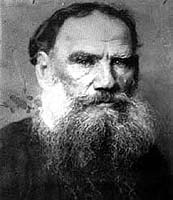| Against Authority | page 79 |
|
 Leo Tolstoy was the first Christian anarchist. He was an aristocrat, born into a family of Czarist Russian nobility, who became a famous novelist. His fictional masterpieces were War and Peace and Anna Karenina.
Leo Tolstoy was the first Christian anarchist. He was an aristocrat, born into a family of Czarist Russian nobility, who became a famous novelist. His fictional masterpieces were War and Peace and Anna Karenina.
He is noted for his pacifism as well as his anarchism. His most notable pacifist-anarchist work is The Kingdom of God is Within You. Although there were quasi-anarchist pacifists which preceeded him, such as Anne Hutchinson in the 1600s and the Non-Resisters of the early 1800s, Tolstoy was the first known full-fledged anarchist in this Christian tradition.
Tolstoy was a supporter of geoism, and kept a photo of Henry George on his desk. His description of the state was apt: "Government is an association of men who do violence to the rest of us," he wrote. He had a novelist's gift of phrase.
I sit on a man's back, choking him and making him carry me, and yet assure myself and others that I am very sorry for him and wish to ease his lot by all possible means - except by getting off his back. - Leo Tolstoy, War and Peace Leo TolstoyHe had a huge influence on Mahatma Gandhi, so his legacy goes on. To this day, Tolstoy is popular among adherents of non-violence and Christian anti-war activists.
Men need only understand this, they need only cease to trouble themselves about the general external conditions in which they are not free, and devote one-hundredth part of the energy they waste on those material things to that in which they are free, to the recognition and realization of the truth which is before them, and to the liberation of themselves and others from deception and hypocrisy, and, without effort or conflict, there would be an end at once of the false organization of life which makes men miserable, and threatens them with worse calamities in the future. And then the kingdom of God would be realized, or at least that first stage of it for which men are ready now by the degree of development of their conscience. - Leo Tolstoy, The Kingdom of God is Within YouTolstoy's pacifism (as opposed to non-aggression) and theism (most anarchists are free-thinkers if not outright atheists) are unusual in anarchist thought. Yet such ideas are certainly compatible with opposition to state. Furthermore, as Gandhi proved, non-violent resistance can be an effective means for social change.